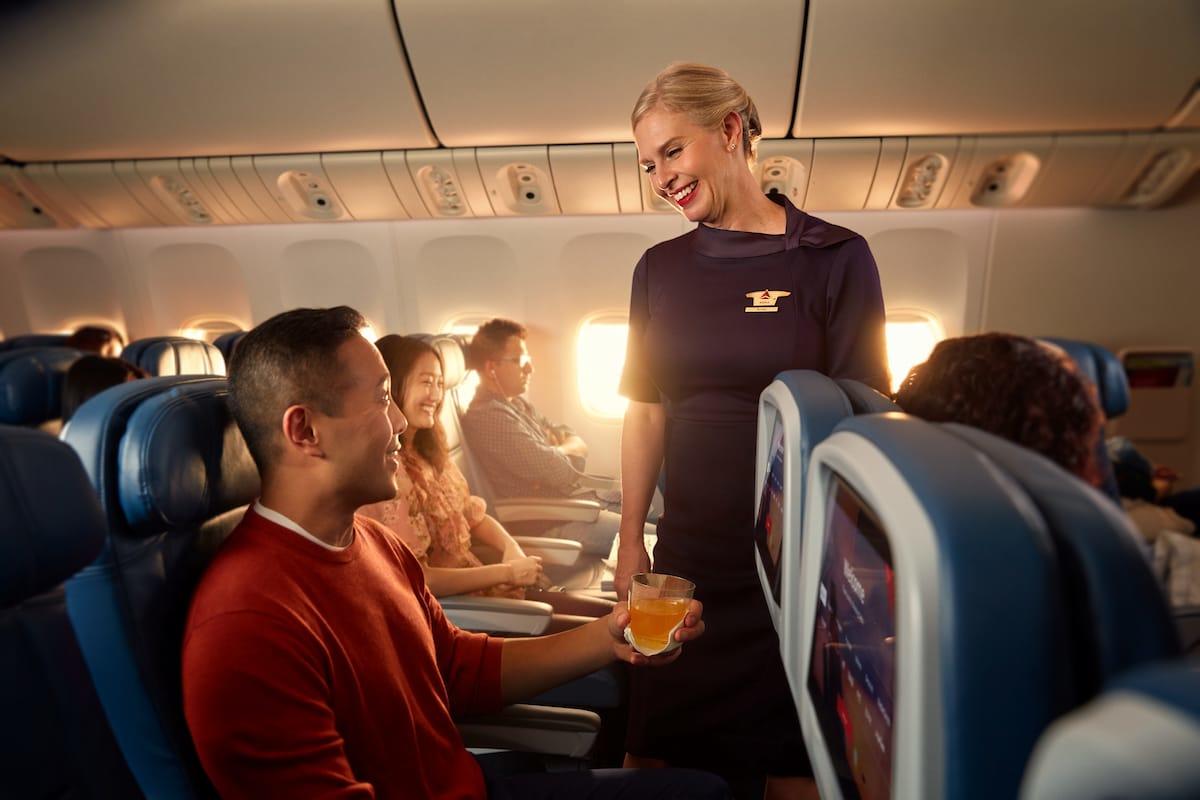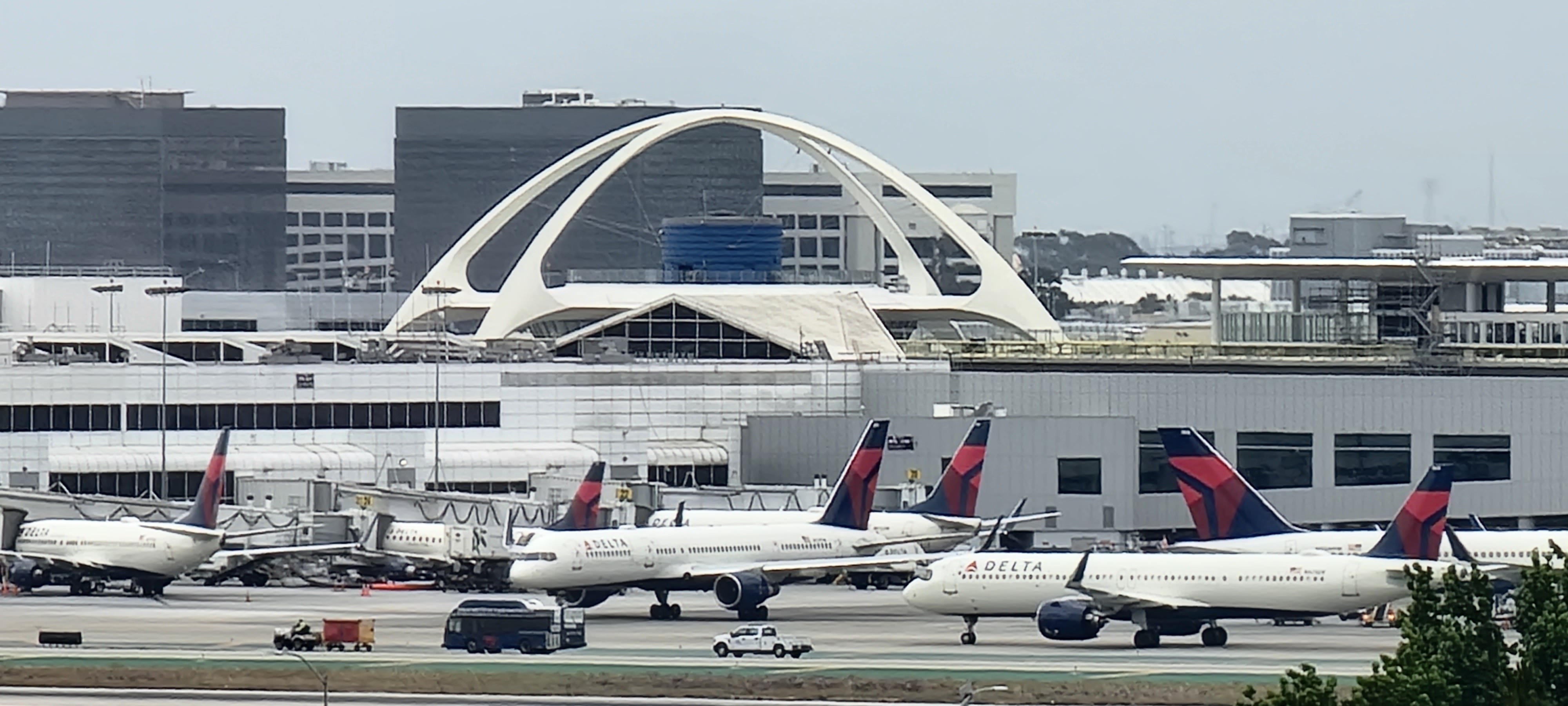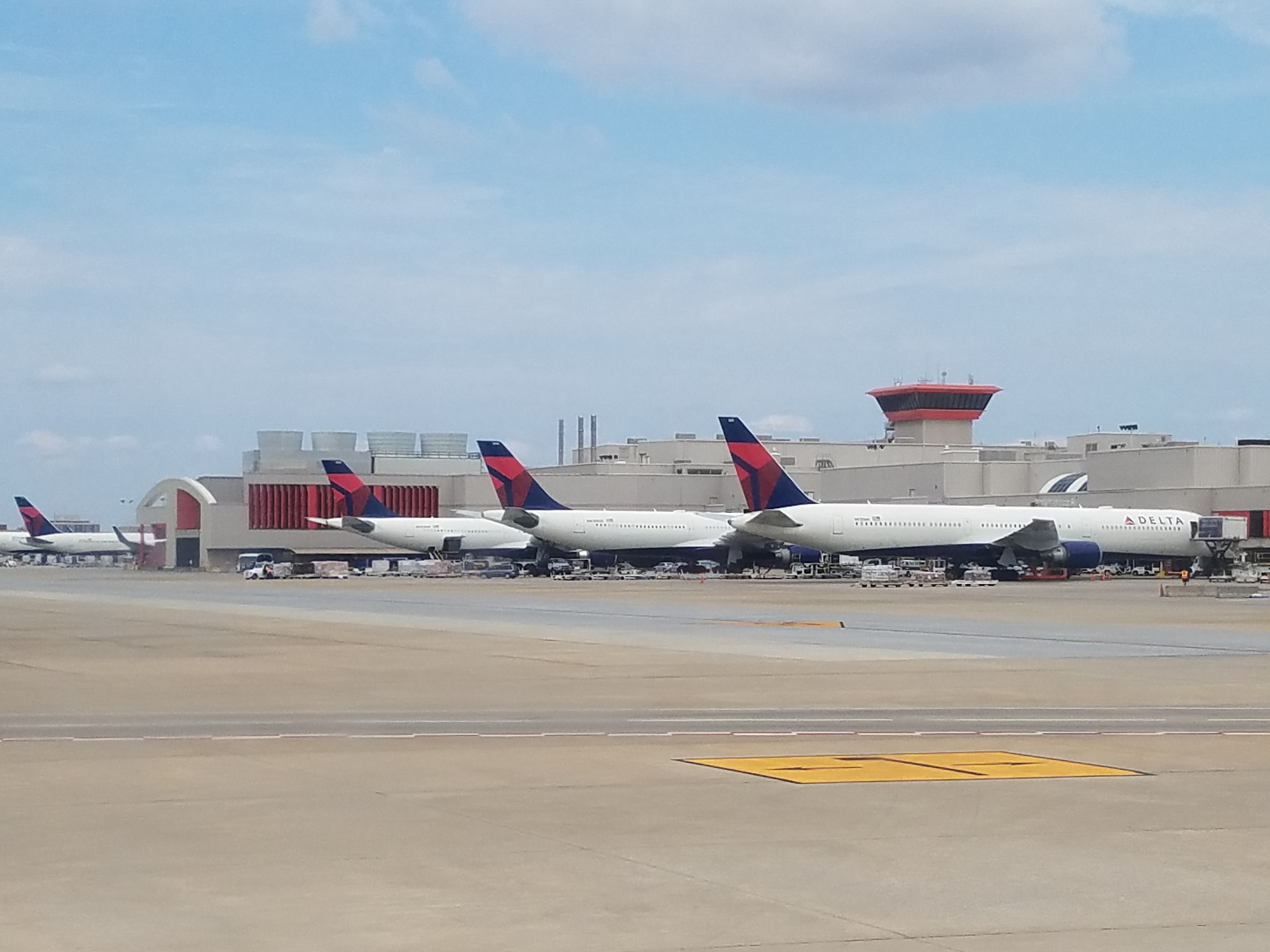Despite the uncertain economic environment – airlines are rapidly pulling their earnings guidance – Delta Air Airlines is giving non-union employees pay raises effective June 1. 4% increases in hourly base pay will go to ground employees and flight attendants, while a 4% pool for merit raises is established for eligible employees (some will earn bigger increases and some smaller).
Union employees – pilots and dispatchers – have their pay governed by a labor agreement and naturally aren’t eligible for this separate increase.

This was announced today and first reported by aviation watchdog JonNYC, and subsequently shared by Delta.
DL raises
— JonNYC (@xjonnyc.bsky.social) April 29, 2025 at 9:52 AM
Delta has increased pay 25% since 2022, and given annual raises each year outside of 2020 and 2021 during the pandemic (where they managed to avoid furloughing even a single employee, while five figure furloughs were in place at United and American).
Flight attendants at Delta receive annual raises. United Airlines flight attendants haven’t had a raise in five years while the purchasing power of their pay has been eroded by significant inflation.
- Delta’s flight attendants, indeed most of their employees, are non-union.
- In the airline industry, union contracts maintain the status quo and never ‘expire’. They merely become ‘amendable’. And they typically take years to negotiate. Union workers cannot even strike without federal government permission, which is rarely forthcoming (even a Biden administration-dominated National Mediation Board did not permit it).
- It’s only the most recent flight attendant contracts that have included retro pay to account for this time. And that doesn’t solve the issue of lower-paid flight attendants having to get by for less in the meantime.

In a recent online discussion of the unionization campaign among Delta flight attendants, the small vocal group of AFA-CWA activists were pushing a line that – after recent contracts – American Airlines, Southwest and Alaska Airlines cabin crew are making more than Delta cabin crew. That simply is not true.
- One area where unions have pushed is for flight attendants to get boarding pay, which Delta pioneered for their flight attendants in 2022 (even where flight attendants have gotten retro pay in new contracts, it hasn’t included boarding pay). AFA-CWA did not get boarding pay with their new Spirit Airlines contract.
- Another area unions have focused on is matching the Delta profit-sharing formula. However getting the same formula isn’t getting the same money. American Airlines gave flight attendants the formula, but has not been making money. Southwest just reported a loss as well. At Delta, it’s meant an extra five weeks of pay.

Despite getting up to par with Delta’s non-union flight attendants being a core focus of union pattern bargaining, organizers of Delta flight attendants want to ignore the profit sharing component of Delta cabin crew pay because it isn’t ‘guaranteed’. On the one hand they’ve sought to get the at-risk pay Delta offers at other airlines, on the other hand they prefer to pretend it doesn’t exist when comparing pay because it makes union pay elsewhere look bad.
And of course, AFA-CWA has said that their union members at United are universally unhappy at their jobs. The union doesn’t solve their problems. Though cabin crew kick up each month, at best the union is neutral. What the union reported is that:
- 91% of AFA-CWA union members at United feel unvalued by their company
- 99% feel their issues are unresolved
- 96% find United management unresponsive during irregular operations
Yet somehow locking union members into a long-term contract spelling out the full details of their work life in binding language is supposed to be a panacea for all of this, and that’s what organizers promise to Delta cabin crew.

I don’t think I’d want to be working as a flight attendant at United or American without a union (though their unions don’t seem to do right by their members). But the idea of ‘pushing the button’ for one at Delta seems crazy to me.
- They already get top of industry pay
- They get annual raises and big profit sharing bonuses
- And the arrangement they have is part of the secret sauce that makes Delta profitable in the first place, makes those wages possible, and forces other airlines to pay their unions what they do

In the fall AFA-CWA head Sara Nelson said she as months away from unionizing Delta’s flight attendants. But why pay fees to a union (especially one where flight attendants don’t have a direct say in leadership) to get less? If anything the threat of unionization encourages Delta to pay more – but it’s something far better for employees as a threat than a reality. Keep the future potential there, don’t actually do it.


This is why you don’t want a union. Without a union, the company will react to pressures from the market and from employees. They’ll pay more. When you have a union, you’ll get stuck with whatever the union bosses negotiated and that’s it.
Delta has demonstrated that it is the best-run business in the airline industry and the best run airline based on a combination of customer service and operational metrics.
as much as UA talks about “being near getting to a deal with its FAs” this undoubtedly hits a reset on negotiations.
add in that UA’s mechanics are also under an amendable contract and overwhelmingly rejected the contract proposal that the union and mgmt agreed to, UA’s two most vocal unions are trying to get paid what they are worth.
and DL’s pay raises further put pressure on the entire industry. Since covid, DL has led the industry in hiking pay, undoubtedly knowing full well that the outcome will be that 1. some airlines won’t be able to afford the pay raises but will pass them out to put a lid on labor discontent or 2. airlines will not increase pay and see labor discontent and a decrease in customer service
Either way, DL wins.
All the nonsense with unions in America needs to be replaced with robust employee rights legislation. The concept of a union just doesn’t make sense. I get that unions have achieved great things. What’s overlooked often is how they’ve stymied progress as well. Because of unions, AA and UA can’t apply performance management on its employees. There was a Reddit post the other day from a UA Polaris flyer who said the flight attendant interrupted him when he was ordering coffee with cream, admonishing him that the way to order that is to say “white coffee.” That’s both untrue and unprofessional in one fell swoop but why was such a flight attendant serving in Polaris no less? Because the flight attendant was senior and was protected by the union from performance terminations.
Performance management is the key to a strong workforce and unions stymie that.
Congrats to those who got a well deserved raise! Happy employee, happy employer. Hope the salaries “keep climbing” 🙂
Our union should be ashamed.. What am I paying union dues for? We still dont have a contract at United.
Unions in the transportation sector (including railroads and airlines) are impotent by design of Congress. Congress cares more about the trains and planes running on time than if flight attendants or train conductors make a liveable wage.
Heavy restrictions on striking defang unions by changing the Nash wage bargaining equilibrium (improving the outside option for airline or railroad companies in the case of “no deal”). These union restrictions paradoxically make the union counterproductive to workers by making “wildcat striking” more difficult. Lacking any real ability to improve worker pay, these hamstrung unions try to justify their existence through expansion efforts (unionizing more workers) and silly regulations in the union contract (like flight attendants not having to help people with their carry on bags).
DL’s flight attendants have earned every last penny of this raise. They are, quite simply, the finest flight attendants of any US carrier, period. While some argue this is because they are not unionized, I would argue it is a reflect of DL’s culture and hiring practices. While we might always agree with the decisions they make, DL’s focus on the consumer has been relentless since they emerged from bankruptcy. Why do I say this? Because that same relentless focus on the consumer extends to the unionized employees at DL who are also the best in the business.
The 2016 to 2021 amendment to the contract was signed on 28 August 2016 and per the implementation documents, the yearly pay increases (page 28 of the amendment) were effective upon signing (search online for the documents as I did and I did not see anything indicating that another date was the date of the yearly increases). The last yearly pay increase would have occurred on 28 August 2020. So 28 August 2021 would be 1 year without a yearly pay increase. 28 August 2022 would be 2 years without a yearly pay increase. 28 August 2023 would be 3 years without a yearly pay increase. 28 August 2024 would be 4 years without a yearly pay increase. 28 August 2025 would be 5 years without a yearly pay increase. The flight attendants have not gone 5 years without a yearly pay increase. Further, there are step raises for those still moving up steps. Some flight attendants have been getting those yearly raises since they started and are still getting them. I agree that some flight attendants, but not all, haven’t seen a raise in 4 years 8 months.
This is why Delta is just a better ran operation. It’s why during the pandemic they were so much more nimble than others. Unions had a purpose once and still do in very select places. I agree with the poster above labor laws are what is actually needed. Giving money to unions to do nothing is a bad idea. glad Delta is yet again setting the bar for it’s employees!
I might be interested if the USA had Eighth Freedom of The Air – the right or privilege, in respect of scheduled international air services, of transporting cabotage traffic between two points in the territory of the granting State on a service which originates or terminates in the home country of the foreign carrier or (in connection with the so-called Seventh Freedom of the Air) outside the territory of the granting State (also known as a Eighth Freedom Right or “consecutive cabotage”).
I might be interested if the Jones Act on cruise ships were cancelled..
View from the wing is NOTORIOUSLY anti-union and anti-flight attendant.
It is true that Delta has better profit sharing results, they have better profits. It’s also true that it is not promised.
The ONLY reason boarding pay became an industry standard is because the flight attendant unions started a campaign for flight attendants to be paid for all their time at work. (Que VFTW stating that they are paid for all their time). They don’t want special metrics, they want to be paid from clock in to clock out.
Delta saw this coming and threw a wrench in the works, giving into boarding pay to create a new industry standard, not only creating a fake idea of them being pro-worker, but also throwing water on the ground pay fire.
The truth is that every scrap Delta throws its flight attendants is in response to what is going on at Unionized carriers.
Union contracts have annual increases along the lines of DL’s 4% or more. DL doesn’t want the FAs or any other work group to unionize, so give them a “contract” that looks like the other majors.
UA’s inability to secure a contract with the FAs is a fail for AFA and UA.
Tim, did you wet your pants a little when you saw this article? And I’m not referring to urine.
pilot
that is simply false.
There is and has been no increase in UA’s contracts beyond the amendable dates.
and not getting labor contracts with all 6 major non-pilot groups is not only a fail for UA but also indicative that their labor costs will dramatically increase – or they will face an increasingly hostile workforce and lower customer service.
it’s amazing how much Kirby talks about how much he wants to emulate Delta – except when it gets to their core principle of providing industry leading pay to their employees.
Throughout all this, something simple is missed in these pay and compensation conversations. As a flight attendant that was unionized at one point, I can speak to both sides of the situation and I can say being able to come to work and not feel like I’m constantly at war with my employer is worth a little sacrifice on some work rules and pay sometimes.
Good for Delta’s employees. I’m genuinely happy for them. Delta’s pilots union has been around since 1934. I still think the flight attendants and baggage handlers should organize, too.
One more time for the folks like @FNT Delta Diamond, who love to hate: Unions are generally good for workers as they advocate for better wages, benefits, and working conditions, leading to increased job security and a stronger middle class. Unions also promote safer workplaces and reduce inequality by increasing the collective bargaining power of employees.
@Unintimidated — That’s a fine idea, too, however, who’s going to get that employee rights legislation passed? Probably, unions! Bah!
Thanks for the article! I’m a Delta flight attendant for 28 yrs now and I’m grateful to be working here. We don’t need a union at Delta. Why pay for union dues when we are getting raises and profit sharing? We were the first to get boarding pay as well. Keep climbing Delta!
@Ting Eng — So, you must have seen the posters then. So, how’s your video game?
So glad for this article. It would be SO interesting for Wall Street to estimate the $$ value-added, to profit, of happier employees. As a frequent traveler it’s easy to see the difference and I vote with my dollars. I travel out of ORD and fly Delta, even if it involves an extra leg. That’s the value to me of a sincere smile.
1990 must work for a unionized company and wishes he/she was at Delta. With that mentality, Tsk…tsk. “I still think they should organize too.” Short sighted. Why shoot the golden goose and pay some self serving union to pretend to be a better golden goose? Delta can “Keep Climbing” without any union. As Ed Bastian has said many times, “Hire the right people. Let them do their job. Stand back and watch the magic happen.” All while the employees take home a well earned 5 week profit sharing check WITHOUT a union! 1990, I wouldn’t apply at Delta. You would hate it because you would have to do your job without having some union thug breathing down your neck saying, “That’s not in the contract!” It’s called self reliance and using your own head to complete the task. AND…if you save the company money by innovation and it is recognized, you might get a nice piece of the savings, too. That has happened numerous times.
@ TD,
I think you misread my post, I never said United, I said Union, meaning airline unions specifically.
You shot off too quick without reading.
@Win Whitmire — In ways large and small, each of us has benefited from unions, even if we’ve never worked for or paid dues to a union. For instance, 8-hour work day, minimum wage, child labor laws, and/or Social Security, just to name a few. Specifically, within aviation, unions have actively advocated for stronger safety regulations and procedures, including flight- and duty-time limits, minimum rest requirements, and pilot qualifications, again, just to name a few. So, yes, yet again, the flight attendants and baggage handlers should still organize. Ed can still do what he does. I still like Delta as a passenger and frequent flyer, too. A union would not detract. Their pilots union hasn’t and it’s been around since 1934, as I’ve said many times on here. They still innovate, too.
And once again – proven correct! The unionized carriers will be “chasing” the non union Delta FAs. When will the union members learn they are set up to always be chasing non-union Delta? How deceptive to always falsely believe union rhetoric solves all of your problems and working without a union is to an employees detriment….
Delta proves union rhetoric FALSE again – and raises the bar for ALL the flight attendants. It is just sad, that many will have to wait years with a lackluster contract and years of negations to once again catch up to Delta.
The Delta Difference
Keep climbing ✈️
After many decades of the same old same old, Delta decides to throw pennies to non-union employees. They are scared of losing control over them. Imagine the cost to Delta if employees are unionized both monetarily as well as many other issues. Delta is not stupid.
What makes it so strange is a day doesn’t go by that Delta’s in the news about some negative episode .
So they throw crumbs to employees in the hopes that everything remains status quo .